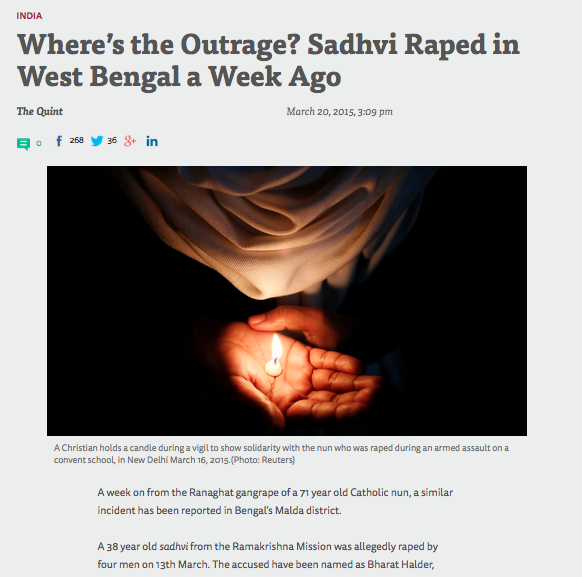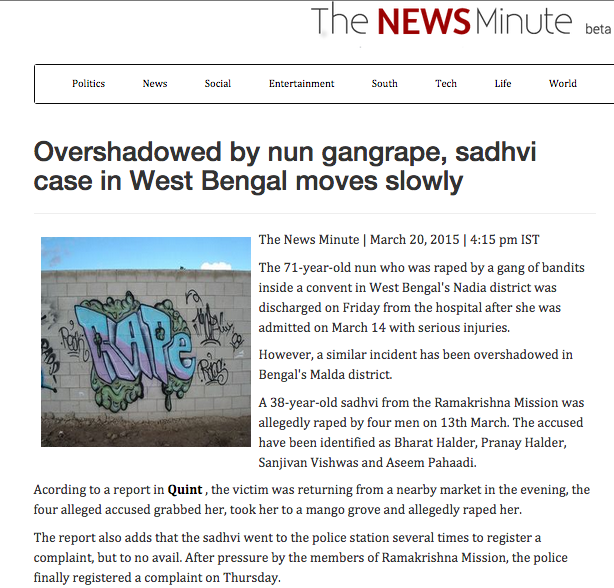About a week later, a report of another rape in Bengal began to circulate on social media.
Sadhvi of Ramkrishna Mission is not a woman? Or this is not sensational because she doesn't belong to minor religion? pic.twitter.com/opbZJDXKKN
— RSS (@RSS_Org) March 20, 2015A Twitter handle that calls itself "an independent initiative of RSS Swayamsevaks" posted a report from the Hindi newspaper Patrika saying a sadhvi of the Ramkrishna Mission had been raped in the district of Malda.
The report appeared on the front page of Patrika’s Kolkata edition on March 20 with the headline, “One more Sadhvi gangraped.” The strap said, “Sadhvi of Ramakrishna Mission dishonoured, police registered case after pressure from the saints.”
The facts of the case, according to the report: a 38-year-old sadhvi was raped by four men on March 13. She went to the police repeatedly but instead of filing her complaint, the police tried to hush up the case in collusion with the accused. The priests of the Ramakrishna mission were forced to intervene. Their pressure led the police to file a case.
The Patrika report became the basis of stories in at least two English-language news websites, which contrasted the lack of attention to the sadhvi's case with the furore over the nun's rape.

Source: The Quint

Source: The News Minute
Distorted facts
The Patrika report and its spin-offs might have circulated widely in the rest of India, but in Kolkata, few had heard of the rape of a sadhvi, not even officials of the Ramakrishna Mission, to which she purportedly belonged.
Founded in 1897 by Swami Vivekananda, a disciple of the mystic Ramakrishna Paramhansa, the organisation is headquartered at Belur, outside Kolkata. Its monks and volunteers work in many states but are most influential in Bengal.
"Ramakrishna Mission does not have any sadhvis," said an official at the mission’s cultural centre in central Kolkata. "Our sister organisation, Sharda math, has sadhvis but there is no centre of the Sharda math in Malda."
The queries were redirected to Swami Divyananda, the secretary of Belur math. Even before a full question could be posed, at the mere mention of a rape in Malda, he was quick to point out an inaccuracy that had appeared in the Bengali-language paper Ei Samay. “The paper reported that I was insulted by the police superintendent of Malda district when I called him to draw his attention to the rape. That’s incorrect. I have issued a clarification.”
But was it indeed true that a sadhvi of the mission had been raped? “The woman is not a sadhvi,” he said. “She is the mother of two of our students. A poor tribal woman, she lost her husband. We arranged for the education of her sons. She was initiated by guru maharaj, that is, she took dikshaa, which means she has become a disciple of the math. While I feel for others too, who have been tortured, in this case since I knew the woman, I called the police superintendent to seek his help."
A visit to Malda
Mango orchards, dense with blossoms, ring the village, which lies outside the town of Malda, 350 kilometres north of Kolkata. Home to the Sauria Paharia tribal community, the village is a cluster of thatched huts. Most of its residents, both men and women, work as daily wage labour.
The evening of March 13, past sundown, a woman walked home through the sepulchral orchards, when four men of a neighbouring village accosted and raped her.
Her husband long dead, her sons away at school, she took time to confide in her relatives. But once word spread, the elders of the community conferred and a collective decision was made: they would take the case to the police.
Five days after the assault, three of the four men were nabbed by the community and marched to the police station in Malda town. On the way, one of them slipped away. The fourth man had escaped earlier. But the other two were immediately taken in police custody.
The woman’s satisfaction at seeing her assaulters put behind bars was, however, marred by a harrowing encounter with the media. After her statement was recorded by the police, while she was being taken to the hospital for a medical test, cameramen mobbed her, and reporters stuck microphones into her face. “‘Tell us what all happened? How many were they?’ I said nothing,” she told Scroll.in, demonstrating what she did to evade them: she wrapped her sari pallu over her head.
Politics over rape
But in Bengal, it isn’t just the voyeurism of the media that survivors of sexual violence have to contend with. Politicians in the state have frequently reduced rape to a political football.
In 2007, the leaders of the Communist Party of India (Marxist), which was then at the helm of power, refused to acknowledge charges of rape against its party cadre in Nandigram, the site of violent clashes over land acquisition for industry. They said the cases had been fabricated.
Then at the forefront of the movement to protest people being evicted from their plots, the leader of Trinamool Congress, Mamata Banerjee, vocally took up the cases of rape survivors. But her empathy ran out soon after she took charge as chief minister in 2011.
In February 2012, call-centre executive Suzette Jordan was raped on Kolkata’s Park Street. Days later, a woman was dragged out of a train and raped in the fields of Bardhaman district. In both instances, the chief minister lost no time in describing the cases as “sajano” or staged, accusing the women of participating in a conspiracy to malign her and topple her government.
In recent months, the chief minister might have exercised more restraint in her pronouncements against women, but the political churn in the state appears to be impinging on the narrative of sexual violence in a different way. The Bharatiya Janata Party won 17% of the vote share in the state in the 2014 Lok Sabha election. The party has been able to tap into the sentiment among a section of the Hindus that the Trinamool government is tilted in favour of religious minorities. Though the Patrika, as a Hindi news daily, has limited influence in a Bengali-speaking state, its report about the attack appears to play on the same sentiment.
The resident editor of Patrika in Kolkata, Rajiv Harsh, however insisted that there was no intention on the part of the newspaper to “sensationalise the Malda case or give it a communal colour”. He conceded that a dikshita (disciple, initiated) was different from a sadhvi (renunciant), but then countered that the definition of sadhvi itself was flexible. “She is a widow, she has taken diksha, many people would see her as a sadhvi,” he said.
Rohit Khanna, the editorial head of the Quint, said the site simply picked up the story from Patrika, which it sees as a credible news source. "Most of the times you would like to corroborate the information but sometimes you are not able to," he said, "and the Patrika is not a fly-by-the-night publication."
Dhanya Rajendran, the co-editor of the News Minute, said the site in turn aggregated the report from the Quint, with which it has a content-sharing partnership. "Normally, we are careful not to publish reports which we cannot independently verify," she said. "I am often asked why are you not covering this riot, why are you not reporting on that case, and I say how can I report if I am not there."
Another attack
The Patrika report also contained a reference to another case in Bardhaman district, where an elderly woman was raped and murdered outside her house on March 18 during an annual festival. The report identified the woman as a sadhvi of the Vaishnav sampradaya (a community that worships Lord Vishnu). According to Harsh, the fact that the woman was a widow, lived alone, and was hosting prayers during a religious festival, made her a sadhvi. But in the village, her bereaved son clarified that while his mother, a widow in her eighties, spent much time on prayer, she had not taken vows to renounce the world.
When asked why the paper emphasised the religious identities of the women, Harsh said, "What is wrong in that? Doesn't the term 'nun' denote a particular religion?"
But Swami Divyananda, the secretary of Ramakrishna Mission’s Belur math, hearing about the Patrika report, and the attempt to pit the Ranaghat case against the Malda case, put it pithily: “Sabar upare manus satya tahar upare nai. [The supreme truth is humankind, there is nothing higher than that.] All incidents of violence should be condemned, and none should be compared.”












